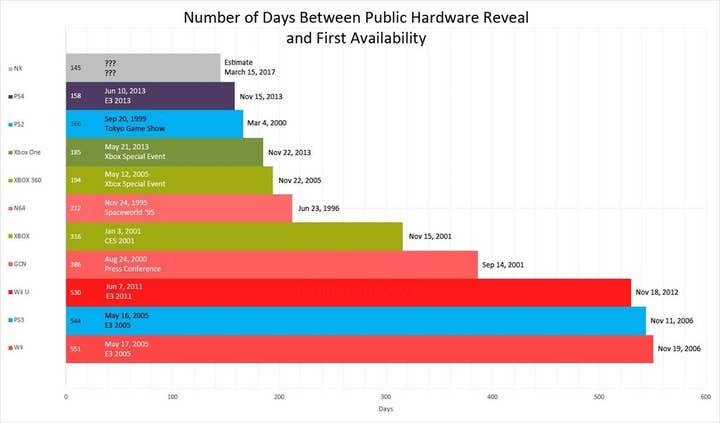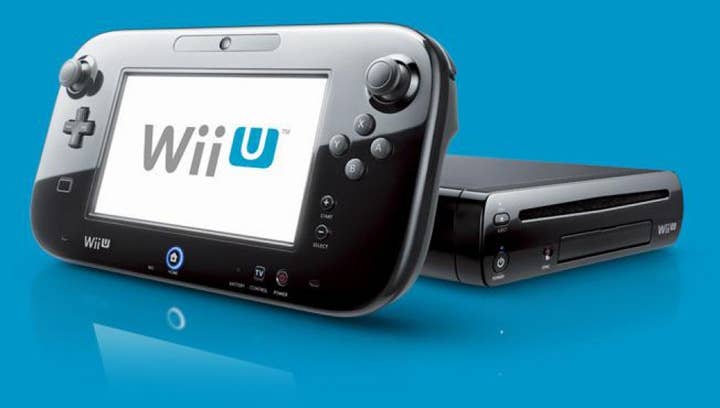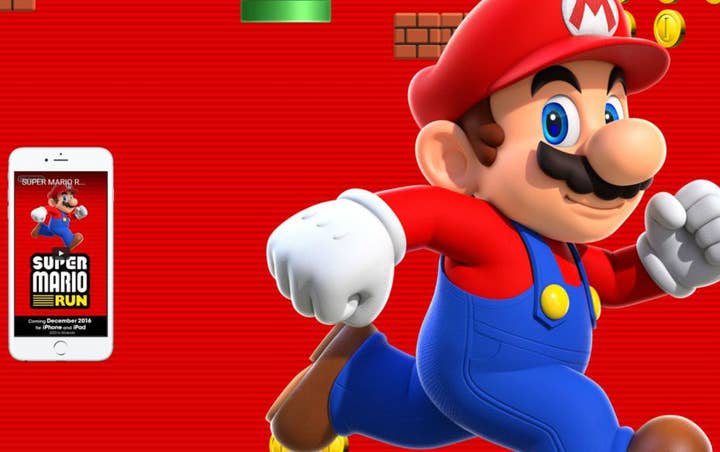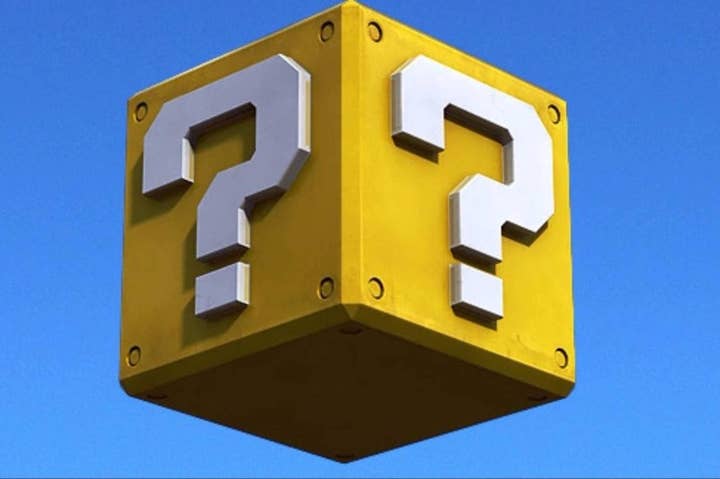Nintendo prepares to unveil the NX - Here's what we know
The speculation ends today, but how bold will the NX prove to be? And has Nintendo got enough time to send the right message?
In just a few hours time, the future direction of Nintendo's console business will become clear. As yesterday drew to a close, the venerable Japanese company finally signalled its readiness to reveal the NX, a piece of hardware that it officially mentioned for the first time in March 2015, and a looming, enigmatic presence in every quarterly presentation since then.
Today, at 10am ET / 7am PT / 3pm BST, the press, public and investors alike will be given the first proper look at the new console, in the form of a three-minute "preview trailer." Exactly how much we will learn remains mysterious, with Nintendo issuing a reminder that the trailer is the, "preliminary announcement of information regarding the platform." Nevertheless, even this was enough to boost the company's share price by almost 5%, adding $1 billion to its market value.
Check on GamesIndustry.biz later for the full story. In the meantime, here's what we know about the NX so far.
"Perhaps a short lead time for a console might actually spur fans to excitement, rather than denying the new system a build-up"
Nintendo is leaving it late
Nintendo showed its hand early regarding the launch date of the NX, targeting March 2017 as far back as April this year. This seemed like an example of careful planning, leaving almost 12 months of time and trade shows in which to unveil the new hardware and damn well ensure that the public understands what it is and what it does. Six months later, with big stages like E3, Gamescom and the Tokyo Game Show all in the past, we're still waiting on even a few minutes of video - this could also be an example of careful planning, of course, but it's getting more and more difficult to offer Nintendo the benefit of the doubt.
Indeed, a chart created by Reddit user MikeMania neatly captures just how much time console manufacturers allow between unveiling and launch. As Venturebeat notes, even if Nintendo releases the NX at the very end of March it will still have the least available time for messaging of any major console: 158 days, with the next shortest being the PlayStation 2 on 166 days. That didn't work out too badly for Sony, obviously, but it's worth noting the 551 day run-up Nintendo had with the Wii, the most successful console in its history.

When Nintendo announced its intention to launch the NX in March, the prominent analyst Michael Pachter said that picking a spot so close to the end of a fiscal year provided ample room for a delay. In doing so, Nintendo didn't need to include NX revenue in its financial guidance, and it still had a period of months in which the console could be pushed back without missing the holiday season. On the other hand, our own Rob Fahey posited that long lead times between unveiling and launch is "quite unusual" within the broader tech landscape.
"Compare that to smartphones or tablets, which are generally available to buy within a matter of days or weeks after they're first unveiled," he wrote in an editorial from March this year. "That short lead time doesn't seem to stop Apple's devoted fans from camping out to buy a new iPhone; perhaps a short lead time for a console might actually spur fans to excitement, rather than denying the new system a build-up."
"The challenge of clearly explaining how the NX works and where its value lies - specifically in relation to mobile devices - should not be underestimated"
The NX will be a hybrid console - probably
Among the caveats to Fahey's argument was one that might prove relevant to the NX. "If the NX console is really a complex concept that it takes people a while to get their head around, then perhaps that will be problematic," he said, with a "short, intense few months of promotion" likely to benefit a device that is, "merely an interesting twist on the familiar."
Nintendo's own vague descriptions have suggested the former, with the company's president, Tatsumi Kimishima, touting the NX as "a different concept gaming machine" that "will allow for a whole new way to experience hardware and software together" back in April. Even as long ago as December 2015, Kimishima was assuring Nintendo's investors that, "we're not building the next version of Wii or Wii U. It's something unique and different." Of course, it's entirely possible that Nintendo is talking up a radical new direction while actually creating something closer to Fahey's "twist on the familiar," but subsequent reports have suggested that Nintendo is indeed developing an original concept.
In July, Eurogamer reported that the NX would be a "high-powered handheld console with its own display," albeit one with detachable controllers that could easily be connected to a television for big-screen gaming. It could be argued that this concept is couched in a great deal of familiarity: the Wii U gamepad, Nintendo's success with the Game Boy and the 3DS, and the huge popularity of smartphone and tablet gaming. But it also promises to be the first time that handheld and home consoles have been united in a convincing fashion, and the challenge of clearly explaining how that will work and where its value lies - specifically in relation to now ubiquitous mobile devices - should not be underestimated.

Nintendo needs a hit
It is surely unfair to allow the failure of a single console to sour the perception of any company with such a long and impressive history. After all, the Wii U is hardly the first time that Nintendo has stumbled, and it has displayed a remarkable knack for turning those defeats into deserved victories. However, the 60% decline in net profit it suffered in the last fiscal year cannot be ignored, and nor can the $230 million loss it made in the first quarter of this one - its largest Q1 loss in five years. These are just two examples from several years of financial turmoil for Nintendo, a period in which its ability to operate in a radically altered games market has been persistently (and often justifiably) questioned.
In July, Tatsumi Kimishima revealed that, at one point, the Wii U was projected to sell almost 100 million units worldwide - roughly in line with the lifetime sales of its predecessor, the Wii. By June this year, after nearly four years on the market, it had sold only 13 million units, a categorical disaster that can be attributed in no small part to a failure of messaging - see the chart above for just how much less time Nintendo has to get that right with the NX.
"Nintendo needs to rebound with the NX to remain a relevant platform holder over the next five years"
Of course, Nintendo has enough money in the bank to weather a few more storms, but it's whether the company's image can withstand another failure on the scale of the Wii U is another matter - particularly when the alleged nature of the NX's design would suggest it will be focusing on a single piece of hardware for the foreseeable future. "Big picture: the NX is critical to the long term success of Nintendo," said EEDAR's Patrick Walker when he talked to GamesIndustry.biz in April. "Nintendo needs to rebound with the NX to remain a relevant platform holder over the next five years."
Speaking to the Wall Street Journal this week, the Tokyo-based consultant Dr. Serkan Toto was no less clear in his assessment: "Another flop in launching new hardware should be a sign that Nintendo is better off providing its rich game title franchises to smartphones, Sony and Microsoft."
Nintendo sees mobile as a feeder for console
That is hardly the first time an analyst has suggested that Nintendo might find greater fortune by focusing on software, and mobile software in particular. Indeed, when it first announced a clear mobile strategy back in March 2015, the debate had already been running for several years. Analysts hate seeing money left on the table, and it was widely believed that Nintendo had disregarded a veritable mountain of the stuff while companies like Supercell and King had risen to dominate the market.
While Nintendo didn't make Pokémon Go - much to the chagrin of its investors - the phenomenal success of Niantic's game has been taken as an indicator of what might be achieved when the industry's most enviable IP stable is brought to bear on the mobile market. The news that the NX was about to be unveiled may have added $1 billion onto Nintendo's value, but the launch of Pokémon Go - a game it didn't even make - almost doubled its market cap. The announcement of Super Mario Run in September had a similarly powerful effect on the stock market, boosting Nintendo's share price by 30%.

However, Nintendo has always been clear about its intention to buck the prevailing trends in mobile. In March 2015, Satoru Iwata, the company's late president, professed a typically polite disdain for the tendency among mobile developers to focus on whales - "a limited number of generous consumers who are willing to spend a lot and analyze what encourages them to spend." Given the company's self-imposed remit to entertain "hundreds of millions of consumers all around the world," Iwata insisted that Nintendo would be thinking "'wide and small' rather than 'narrow and large'" when it came to monetisation.
"Nintendo has always been clear about its intention to buck the prevailing trends in the mobile market"
"Above all, as Nintendo is a family brand, we do not intend on changing the situation where parents and guardians can give Nintendo products to their children with peace of mind," he said. "In that sense, we want to pay very close attention to how we receive money."
Ultimately, that means embracing the premium model to a degree no other company of Nintendo's size would dare. As Rob Fahey pointed out in a recent editorial, the reason is actually very simple: Nintendo isn't out to squeeze as much revenue from mobile as possible.
"What is very clear from the announcement of Super Mario Run...is that Nintendo is still utterly determined to do mobile on its own terms and nobody else's. I've written before about how Nintendo sees mobile as a complementary business to console gaming - with mobile titles using established, well-loved console IP to drive their success, and in turn drumming up interest in subsequent console games through their broad reach and accessibility.
"Where much commentary has focused on mobile as a threat to console, Nintendo sees the potential for a virtuous circle. In order to realise that, however, Nintendo has apparently decided to take on a herculean task; Nintendo wants to change how the world consumes mobile games."









